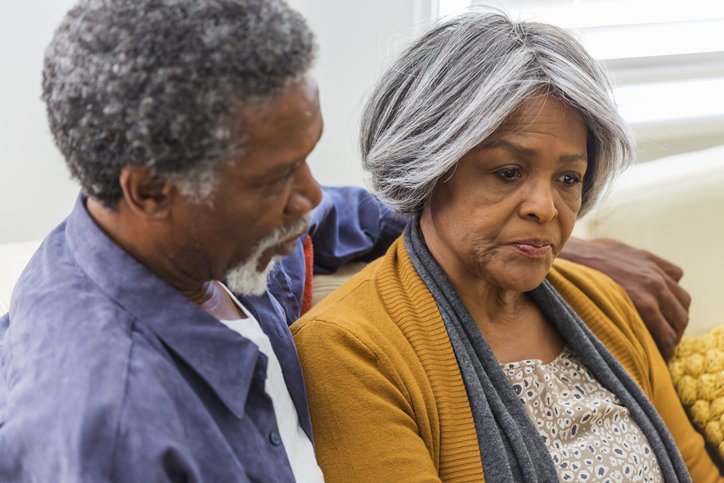Depression in the Elderly: Do You Know the Signs?
We all get the blues from time to time. Usually, we bounce back. But when those negative feelings persist and begin to interfere with our daily activities for two weeks or longer, depression may be present.
Depression is a common yet serious medical illness that negatively impacts how we feel, think and act. While the mental disorder can strike anyone, at any age, senior adults are less likely to seek a diagnosis or to receive treatment. If you’re worried about depression on yourself or a senior loved one, we’ve assembled some helpful information.

We often assume that depressed moods are a normal part of aging. After all, seniors can experience significant loss in terms of health, relationships, independence, and social standing, while also facing their own mortality. However, depression is not a normal part of aging. It is a true mental disorder that can strike children, young adults, the middle-aged, mature adults, and the elderly, at any time.
Although depression is not normal in seniors, it’s also not uncommon. The mental disorder affects about 6 million Americans aged 65 and older, yet only 10% receive treatment, according to WebMD. By some estimates, major depression affects between 1-5% of seniors living in the community; however, it rises to 13.5% for those who require home healthcare and to 11.5% for older hospital patients. While many of those experiencing late-life depression will have had depressive episodes earlier in their lives, others may experience depression for the first time in their 8th or 9th decades of life. Commonly, depression in seniors appears alongside dependency and disabilities, which adds to the distress that the mental disorder can cause.
Geriatric depression is often undiagnosed and untreated. There are many reasons why this occurs:
- The senior lives alone. Living alone can prevent family members from realizing that something is different or has changed about their loved ones. As we grow older, our social circles also tend to shrink, so friends may also not be around to detect changes.
- Mental illness is viewed as a character flaw. In older generations, mental conditions such as depression and anxiety disorders may not be as openly discussed or accepted as they are among the younger generations. The older person may see their depression as a shortcoming and want to hide it from others. As a result, they may not mention their symptoms to their doctor or refuse to visit a mental health professional.
- Family members, friends, and medical professionals don’t know what to look for. Geriatric depression can look very different from the typical warning signs of depression. While seniors with depression do experience long-lasting sadness, lack of self-worth, loss of interest in daily activities, and other common symptoms associated with the mental disorder, their symptoms may manifest differently.
- The condition is explained away by other medical conditions and medications. Symptoms of depression can look a lot like the symptoms for a variety of conditions that can afflict the elderly, such as dementia, Alzheimer’s disease, arthritis, cancer, heart disease, Parkinson’s disease, stroke, and thyroid disorders. Medications for certain physical conditions can also provide an easy explanation for behaviors such as sleep disturbances, lack of motivation, and the slowing of movements and thinking.
- Cost. Lack of access to adequate healthcare and concerns over the cost of medications and doctor visits can deter budget-sensitive seniors from seeking help. They may assume that toughing it out or simply living with their clouded thinking is their best bet. However, depression is very treatable through a combination of medication and talk therapy with a qualified mental health professional. Medications for depression can change how the brain is wired and help individuals to manage, and potentially overcome, the illness.
When depression is left untreated late in life, the consequences can be fatal. Depression is the single most significant factor for senior suicide in the United States. However, suicide isn’t the only death risk. Adults who experience depression later in life are more susceptible to having or developing other cognitive disorders, such as dementia. Those with untreated depression are also at a greater risk for heart disease and weakened immune responses, heightening their risk for infection and susceptibility to other diseases.
Depression might look different in the elderly, making it harder to detect. Common warning signs of elderly depression include:
- Confusion
- Decreased or complete loss of appetite
- Delusions and hallucinations
- Memory issues
- Sleep disturbances (too much or too little quality sleep)
- Social withdrawal
- Weight loss
- Vague complaints of physical ailments and pain
Asking a senior if they feel depressed is often not enough. In many cases, “sadness” isn’t the overreaching emotion. Take special notice of these personality changes:
- Help-seeking and/or demanding behavior
- Increased irritability
- Persistent, vague complaints
- Slowed movement or mental processing
While many of the above can occur as a result of one or more medical conditions or medications, it is important to have your older loved one’s doctor look into the possibility of depression. Negative emotional states and mental health issues like depression, anxiety disorders, and stress can manifest in our bodies. A physical diagnosis should not exclude a mental evaluation. Treating depression early and aggressively can help to improve health outcomes overall. Ruling out depression or having it diagnosed can help medical and mental health professionals to get a clear picture of an older person’s overall health and develop appropriate treatment plans.
Depression in seniors is very treatable. In many cases, depression can often be successfully managed with these traditional treatments:
- Psychotherapy
- Medications
- Exercise
- Brain stimulation therapies
- Light therapy
Since treatment is often effective, it’s important for seniors to discuss their symptoms of depression with their healthcare provider. A treatment plan should be catered to the individual; what works for one person will not always work for another. While your older loved one may resist seeking treatment, it’s important to note that untreated depression typically lasts much longer in seniors. It can negatively impact every aspect of their life, but they don’t have to suffer.
Your support can help your elderly loved one to seek help and get better. Here is what you can do:
- Check-in often and encourage them to develop and maintain community and friendships.
- Offer a compassionate ear. You don’t need to fix them; just listen and be supportive.
- Share your concerns about depression with your older loved one.
- Educate family, friends, and healthcare providers who see your loved one regularly about the warning signs of elderly depression.
- Attend visits to the doctor. Your loved one may be too ashamed or shy to broach the topic of a mental health disorder with a physician. Having your support and presence in the room may embolden them to discuss it.
- Let your loved one know that, with a diagnosis and treatment, they can move beyond despair and reclaim the joy they once had in their lives.
If you suspect that your senior family member is depressed and has expressed having suicidal thoughts, do the following:
- Call 911
- Visit a nearby emergency department or your health care provider’s office
- Call the toll-free, 24-hour hotline of the National Suicide Prevention Lifeline at 1-800-273-TALK (1-800-273-8255); TTY: 1-800-799-4TTY (4889) to talk to a trained counselor
Facing the challenges that come with aging can be difficult for seniors, as well as for their family members and other loved ones. By becoming educated and talking about depression in the elderly, we can all be part of breaking the silence that keeps so many from seeking the help that they need.
We hope you find this information useful and that it can help you and your loved ones to experience the best of what life has to offer. If you have questions or need additional resources, please reach out to our caring team.
About Batchelor Brothers Funeral Services: As a leading African American-owned and operated funeral and cremation organization serving three states, Batchelor Brothers Funeral Services has provided a ministry of care to thousands of grieving families. We promise to provide our highest level of distinguished service and respect to families who entrust us to honor their loved one. In all aspects of the funeral process, we strive to be the absolute best and are honored to help preserve our clients’ legacies for future generations. With three convenient locations serving both North and West Philadelphia, as well as Trenton and Drexel Hill, it is always our pleasure to be of service. Please visit our website for more information.







Comments